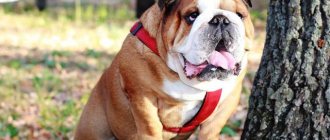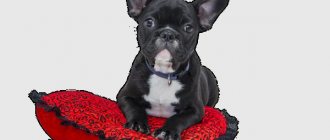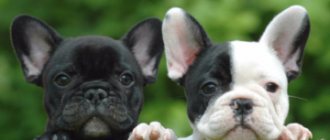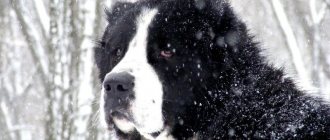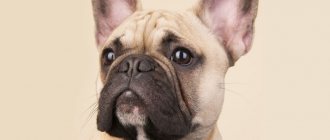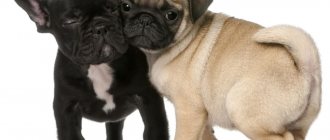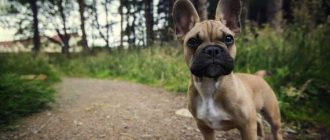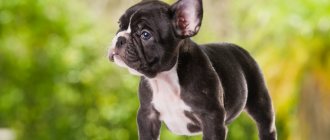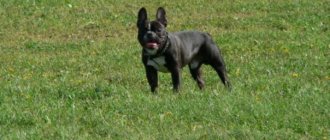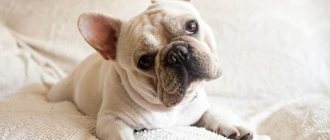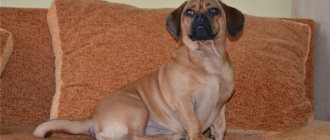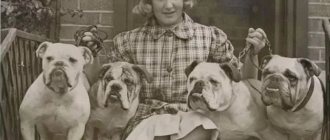French bulldogs are impressive in their abundance of colors: fawn, blue, black, red, cream and many others. When choosing a dog, it is important to remember that some colors are taken into account by the breed standard, while others are not, that is, they are considered a defect. Therefore, if you plan to exhibit the animal, you need to carefully understand the colors.
History of the breed
Despite its name, the breed was not developed in France, but in England.
Its ancestors were bulldogs, which were used for guarding and fighting. Dogs lived in the homes of ordinary citizens and were used to catch rodents. After the bulldog was brought to France, the breeders decided to slightly adjust its gene pool. The result was a decorative dog that became elite. Interesting! Puppies with blue coloring were considered defective for a long time, since they had the D gene.
Purpose
If the distant ancestors of the French Bulldog were used as fighting dogs, as evidenced by the folds and wrinkles in the neck and throat area, then the modern French Bulldog is a decorative companion dog. Thanks to its cheerful but disciplined character and original appearance, this dog is loved by many families.
Description of the breed
The breed was officially registered at the end of the 19th century. It has its own distinctive features, the most famous of which is the unusual shape of its ears. Blue Bulldogs are born with bat-like ears, and their shape cannot be changed. In addition, these dogs have huge, dark, round eyes. The picture is complemented by a short tail and a powerful, slightly flattened skull.
This dog's body is muscular. Short legs easily carry the baby's considerable weight. After all, it weighs from 9 to 14 kg. Males are slightly heavier than females.
Interesting! You can walk with such a dog for hours, but you need to make sure that it does not get close to bodies of water, since this French aristocrat cannot swim at all.
The breed is ideal for life in a metropolis. She does not require much space and is very attached to her owners. If you have no experience with pets or just need a four-legged friend, you should pay attention to this cute bulldog. He is an ideal companion for lonely people and, most importantly, is very loyal to his owner.
When the owner is busy
Genetic factors affecting color
Genetic features determine not only the color of the bulldog, but also the intensity of the color:
- Two fawn or red Frenchies will not produce brindle puppies. From such a combination you can only get the corresponding colors.
- Two brindle bulldogs can produce fawn puppies, but only if both dogs are carriers of the fawn gene (that is, one of the parents was fawn). Theoretically, from such a mating the litter will be 25% fawn, 50% brindle with the fawn gene, 50% brindle without the fawn gene.
- Two spotted bulldogs will not produce solid colored puppies.
- Solid-colored dogs can get spotted-colored puppies if both parents had ancestors of the same color.
Note! All modifier genes are inherited regardless of the main coat shade.
Advantages and disadvantages
Among the main advantages are the following:
- cheerful disposition;
- the ability to become a friend for any person, be it a pensioner, a child or a busy adult;
- indifference to daily walks;
- not demanding on hair care.
All this makes the dog ideal for keeping in the city.
The main disadvantages of the breed are:
- A cocky character, because of which the bulldog constantly starts fights with other dogs.
- Poor perception of training.
- Constant problems with health and especially the respiratory system.
Mating and birth
In females Franc. Bulldogge's first heat begins at 6-8 months. Males are ready for mating by 18 months, females by 2 years. But there are no matings among purebred European French bulldogs. Bitches are artificially inseminated because the body structure of the male does not allow him to fulfill his duties as a successor of the family. Females do not give birth on their own; they undergo a caesarean section and bring no more than 2 puppies.
Natural mating can happen with Frenchies of American blood, but all this should happen under the supervision of specialists. Very often the dogs have to be untied. All problems with conception in dogs arise from the structure of their bodies.
Breed standard
Mass breeding of the breed began after its standards were determined. The signs of a purebred representative are as follows:
- large square head;
- powerful and short neck;
- flattened muzzle;
- erect bat-like ears;
- round and large eyes with a smart look;
- the location of the upper jaw is slightly lower than the lower jaw;
- powerful torso with well-developed muscles;
- strong paws;
- thick, low-set tail. It is thick at the base and tapered at the end. Curvatures and breaks are not considered a defect.
- height no higher than 35 cm.
- The coat is smooth, blue in color. White spots are allowed on it.
Important! Due to the characteristic structure of the nose and muzzle, these dogs have difficulty breathing in hot weather.
According to the accepted standard, there are several color options for French bulldogs. These are brindle and fawn. In our country they are considered signs of the breed. In America, breeders breed individuals with white, blue, gray and other colors. If in Europe a blue tint of fur is considered an unacceptable trait, then there the blue and sable color of a dog is not a reason to consider the animal defective.
Rare
Breeders are working on developing new shades, often producing exotic colors for dogs. Among bulldog owners, white, lilac and blue ones are especially valued. All these shades are extremely rare. Not all exotic colors are allowed by the standard and can be used for further breeding. For example, purple and black are outside the standard, but cream and bicolor are acceptable.
Bicolor
Bicolors include two-color dogs, among which the most common type is black-white or white-black (depending on which color is the main one). In this case, the standard allows color if the spots are located on the back, sides, head (ears, forehead, cheeks) and occupy no more than 20% of the total body area. Limited spotting is allowed - the spots occupy a minimum area of the main color, located on the chest, paws, and on the neck in the form of a tie.
Cream
Cream-colored dogs (also a type of brindle) have light noses, lips and eyelids; this is the main difference between the color and all others. This color is accepted by the American breed standard, but it is extremely rare and therefore highly valued among breeders.
Blue
If there is a mention of blue French bulldogs, then most likely we are talking about a blue dog. They just call it differently to more specifically describe the color, saying that the shade is rich and rare. The blue coloring of bulldogs is gray and silver. This color is very beautiful, but a pet of this color will not be allowed to the exhibition, this is a defect.
Red
Red bulldogs belong to the elite group of colors. Such dogs are valued among dog handlers, they are bred, and they conquer experts at various exhibitions. Red is a rich shade of red or fawn. The cost of such dogs is quite high precisely because of their high breeding.
White
Snow-white bulldogs are an incredible rarity, most often they are congenital albinos. This is a easily soiled color that requires special care. Many puppies that appear white at first glance turn out to be brindle or cream. White color is not allowed by the standard.
Dog character
Such animals love children and do not show aggression when playing with them. They don’t offend strangers, they just sniff with interest and try to get to know each other better.
Sociable by nature, blue bulldogs require attention to their person and can hardly tolerate its lack. But if the owner is busy or tired, they will not impose themselves too much. Despite their activity, Frenchies cannot frolic for a long time, as they are too large for this.
Nice walk
Merle color
It's marble. Not included in the breed standard, although the genes that form it are dominant. Three shades (in most individuals white, reddish brown and dark brown) form vague patterns of different shapes and sizes. There is usually no “mask”.
View this post on Instagram
Posted by @frenchbulldog.puppies.ua
Marbled bulldogs often have heterochromia (unequal coloration of the iris). There is a high probability of having a litter with genetic abnormalities.
Education and training
Despite his intelligence, the French Blue Bulldog is too stubborn. Therefore, it is difficult to educate him and, of course, train him. When the command is repeated several times, the dog quickly loses interest in it. No amount of games will help consolidate a team if the owner does not have special skills.
To interest your pet, you can reward him with a specially stored treat. It is forbidden to shout or hit the dog. If you just quietly reprimand the Frenchman, he will feel guilty and will do what is necessary.
Black
View this post on Instagram
Posted by Barney French bulldog to Moscow (@puppies_from_barney)
The black bulldog is the rarest variety. A continuous color is obtained by crossing brindle dogs for a long time.
The black-haired French pet is excluded from participation in competitions and breeding. Therefore, the black cubs born are castrated. The bulldog is bought exclusively as a companion; in terms of character traits, it is in no way inferior to the varieties recognized by the standard.
It is necessary to distinguish between solid and black-and-white bulldogs. The intensity of the color is influenced by the genetic characteristics of the individual. Since the variety was obtained by crossing brindle dogs, in the vast majority of cases the body is not black, but motley. It’s just that the specks and stripes are small, almost merge with the black background, and are difficult for human eyes to notice. The chest and limbs are decorated with white and beige spots; less often, markings cover the back.
Maintenance and care
Representatives of the breed have short hair, so they do not require daily grooming. It is enough to brush your dog once or twice a week. But you need to constantly monitor the cleanliness of your ears and eyes. And be sure to clean your skin folds a couple of times a week. After this procedure, Vaseline is applied. Moreover, the procedure is carried out both on the body and on the face, which suffers from wind and sun.
Heavy hair loss begins in the fall during molting. At this time, combing should be made a mandatory daily procedure in order to promptly remove dead pieces of skin.
Hygiene
It is recommended to bathe such a dog as needed. For this purpose, buy a special mild shampoo. Large eyes are poorly protected from dust and dirt. To avoid irritation, they are cleaned every day. Ears can be cleaned as they become dirty. Special tools will help you complete all procedures quickly and without injuring the animal.
To keep your teeth healthy, it is recommended to buy special treats that, when chewed, remove dental debris.
Walking, physical activity and rules of safe behavior on the street
Despite the fact that the blue French bulldog does not tolerate much physical activity, he needs walks every day. This allows you to keep your muscles and bones in good shape. After all, this little dog is prone to rapid weight gain.
When walking, the French dog should not be allowed to approach the pond or other dogs. You can't let your pet freeze or overheat. Both are dangerous to his health.
Note! You need to walk your pet for at least one hour a day. This time can be divided into morning and evening exercise
Age-related changes in fur
French Bulldog puppies inherit their color from the parent pair and their ancestors. However, it can be determined already at birth. Fawns are born darker or lighter than the base color, but with age-related molting, the structure of the coat and its pigmentation change.
The color may increase or decrease. There are gray shades that become fawn or red with age.
Brindles are also easily recognized at birth. The intensity of the pigment and the size of the stripes change. There are cases when in puppyhood a dog has small streaks, and by 2-3 years they practically disappear and the color is mistakenly considered fawn.
A little colored wool can then be found in the groin, armpits or along the body. The size of the white spots decreases or increases in any color type.
Features of feeding and diet
Due to the structure of the head, the bulldog does not chew, but swallows food. This leads to improper metabolism. To avoid digestive disorders, you need to work with your veterinarian to develop a diet that will improve the absorption of food.
When determining the size of portions, a whole range of factors are taken into account:
- age;
- size;
- health problems;
- activity and others.
Products should be high in protein and low in starchy substances. In case of stomach upset, the food is divided into small portions, which are given in two or three doses. If your pet is overweight, you need to put him on a stricter diet. In this case, fresh water should always be near the feeding area.
Young dogs up to three months old are fed four times a day. Up to seven months, meals should be three times a day. Adult dogs are fed twice a day.
Waiting for feeding
Important! It is strictly forbidden to give pork to French.
Where to keep a French bulldog
Street maintenance of a dog of the Franc breed. Bulldogge is only possible if a spacious enclosure with a warm house is built for it. After all, these dogs are not guard dogs, they love everyone and suffer silently alone.
Frenchies are indoor, clean animals who don’t even want to enter the house with dirty paws, and are able to sit on the threshold and wait until they wipe them. These dogs cannot tolerate cold, drafts, or heat. The breed was bred to always be close to people.
Additional Information! Due to the structure of the skull during the heat, the dog may have difficulty breathing; you should always take water with you on walks and give your pet water at such moments.
Health and illness
Despite its impressive physique, the French Bulldog still experiences health problems. The most common of them are:
- Intolerance to heat and cold. Breeds of the brachycephalic type do not tolerate high or low air temperatures equally well.
- Problems with the spine. This could be a hernia, a congenital defect, etc., which in complex cases can lead to paralysis. Therefore, if the dog begins to limp, you need to show it to the veterinarian as soon as possible.
- Diseases of the cardiac system - congenital or acquired.
- Visual impairment (conjunctivitis). The diseases are usually hereditary and can be treated surgically.
- Respiratory problems. They are associated with structural features of the head and in some cases can be cured surgically.
- Allergies to certain products, chemicals and cosmetics.
In order for your beloved pet to live as long as possible, you need to monitor its health and undergo a full examination by a veterinarian every six months.
Lifespan and reproduction
The structural features of the body do not allow bulldogs to carry out the fertilization process in the usual way. Therefore, to obtain offspring, artificial insemination is performed. To keep the puppies healthy, a caesarean section is performed at birth.
The average lifespan of blue Frenchies is about 10-15 years.
Nutritional Features
Dogs are fed either natural food or industrially produced food. With natural feeding, the main part of the diet should be meat. Cereal porridges from rice, buckwheat, eggs, and pearl barley are prepared using meat broth. They start feeding cereals very carefully, in the smallest portions, in order to decide which ones will not irritate the pet’s intestines.
Important! The diet should include boiled and raw vegetables.
When feeding industrial food, they use brands that have been tested by dog breeders; if there is a need to switch to another brand, they do this gradually, adding small portions of new food to the proven food. Food must be appropriate for the dog’s age. There is no need to use inexpensive feed that lacks essential vitamins, minerals, and amino acids.
Properly selected food will bring joy to both the dog and the owner.
How to choose a puppy
Since the blue color of a French bulldog is considered a defect in many countries, including our country, it is quite difficult to get such a puppy. After all, dogs cannot be bred for sale, much less sold at a high price. But blue Frenchies, which have become fashionable, are sold in America and cost a lot there. The lowest price for a puppy is $200. Therefore, you need to know how to choose an active and, most importantly, healthy pet.
If the desire to have such a handsome dog is great, then it is best to contact a nursery. There you can see the puppy, examine him and understand how active he is. The breeder must provide the future owner with a package of documents indicating all the parameters of the dog that match the standard. A pedigree is also issued, where it is written that the blue bulldog came from certain parents.
Curious puppy
Basic genetic factors
A little history
Even in the first standards of the French bulldog breed, colors such as liver, brown, blue, black and tan were noted. Unfortunately, in the old days, breeders did not have the opportunity to test animals for the presence of a particular color gene. Accordingly, they could not purposefully breed multi-colored French bulldogs.
But some scientists decided to conduct “blind” experiments, crossing mainly the closest relatives of the same line of dogs. Naturally, they received offspring with many hereditary and congenital defects. As a result, they decided to suspend the breeding of French bulldogs with different coat colors and revise the standard. Therefore, in the modern standard for dogs of this breed there are such restrictions on colors.
But progress does not stand still. Over time, opportunities have emerged for unlimited, and most importantly, safe breeding of healthy French bulldogs with a wide variety of coat colors. In America, work is already underway to introduce prohibited colors. Some representatives of this breed began to be admitted to exhibitions, where they show good results. In Russia, this issue is just beginning to be addressed.
Modern experience
French Bulldog dogs have several official colors, which we wrote about above. But the color of the coat is the phenotype of the animal. Phenotype – appearance, a set of bright visible characteristics. In addition, a dog also has a genotype - a set of obvious and hidden genes.
Accordingly, the genotype of the French bulldog is much more diverse than is commonly believed. A hidden or recessive gene may not manifest itself in any way for years until a suitable half is found. Scientists have not yet established the exact number of genes that influence the color of the French bulldog's coat.
With the advent of new discoveries in the field of genetics, breeders began to breed French bulldogs with blue, blue and tan, tri-color, and chocolate coat colors. But this work is only at the initial stage, so breeders have so far managed to obtain only a small part of the possible range of coat shades from representatives of this breed.
Scientists cannot explain the appearance of some rare exotic coat colors, since this fact is not amenable to any modern method of genetic testing. However, such mystery attracts more and more French Bulldog breed connoisseurs, who are ready to become the first people to receive a new shade of coat in dogs of this breed.
What color is your dog's coat?
If you liked the article, share it with your friends and like it.
Interesting Facts
Among the characteristics of the Blue Bulldog, the most interesting are the following:
- Frenchies get along well with cats and dogs living in the same house with them. But they can become jealous if a new pet appears in the house. Over time, they get used to new family members and begin to respond to them adequately.
- The statement that such dogs are not allergic is erroneous. The substances they secrete are no different from their long-haired relatives. Therefore, people with allergies to dog fur should not own this breed.
- It is incorrect to say that these are very lazy pets. If a dog doesn't move much, the owner is to blame. He doesn't play with her much and most likely feeds her incorrectly.
- Those who like to travel by plane should know that they will have to leave the dog at home. Due to breathing problems, they are not sold tickets, and transporting them on special planes is too expensive.
Transfer of experience
When you get a blue French bulldog, you need to understand that, despite the ease of care, this pleasure will be expensive. But at the same time, a pet will appear in the house, charged with positive energy, which will not let its owners get bored.
Acceptable colors
In addition to standard and prohibited colors, there are also those that are on the border, that is, acceptable . Such dogs can be allowed to participate in exhibitions and even before breeding through clubs, but only if they pass the assessment of strict experts. Such colors are considered defects, but not defects of the French Bulldog breed.
Colors of French bulldogs that are not standard, but are considered acceptable. These include primarily black-tiger. This is when the dog is almost black, but still has barely noticeable inclusions of red hairs. In this case, the main thing is that the black color does not predominate, and the red inclusions are bright.
The presence of markings in the color of spotted dogs is not specified in the standard, but such representatives of the breed often become winners of prestigious exhibitions.
Return to content
Fawn
Solid coat color, formed by both recessive genes and dominants. Differs in shade variability: from light brown to rich red. Tonal variations of each shade in the direction of paling and darkening are possible. The muzzle is decorated with a “mask”; there are small white spots on the chest and belly.
View this post on Instagram
Posted by Aleksandra_ailan'zon (@aleksandra_ailan_zon)
Fawn hairs can vary in tone depending on the length: short ones are lighter, long ones are darker. Dogs whose red hairs have silver tips are called fawn-blue. There are also fawn-tiger individuals (with a predominance of fawn) and fawn-variegated (with a predominance of black areas).
